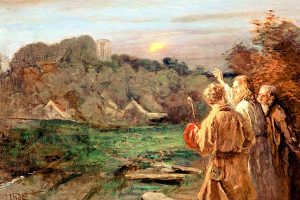Readings (Year B):
2 Kings 4:42–44
Psalm 145:10–11, 15–18
Ephesians 4:1–6
John 6:1–15
Reflection: Bread for all
Saint Augustine taught that the New Testament is hidden in the Old Testament and the Old is made manifest in the New. We see this in John, chapter 6. This Sunday’s first reading from the second book of Kings, like this Sunday’s gospel, describes a hungry crowd—someone bringing forth barley loaves and another objecting that the bread is too little for the large crowd. In both accounts, the people were able to eat their fill. There was a multiplication of the loaves and there was bread left over.
The Old Testament reading features Elisha as the prophet who performs the miracle. In the New Testament, it is Jesus. There are several other miracles performed by Elisha that are also akin to the later miracles of Jesus. Elisha the prophet prefigures Jesus. The New Testament is hidden in the Old and the Old is made manifest in the New.
The hungry crowds in both readings are fed. Their physical hunger is satisfied. But the New Testament account of the miracle is followed by the great discourse of Jesus that we will hear over the next four weeks, in which Jesus identifies himself as the Bread of Life. He is greater than Elisha the prophet and miracle-worker. In fact, as we continue reading chapter six of John’s gospel, Jesus reveals himself as greater even than Moses, the one through whom God fed the people with manna in the desert during the Exodus. Jesus will say words that Elisha and Moses would never dare to say: “I am the bread of life; whoever comes to me will never hunger, and whoever believes in me will never thirst” (John 6:35).
In the gospel miracle, scripture scholars have identified a Eucharistic meaning in the multiplication of the loaves and fish. In the four gospel accounts of this miracle, we find the same verbs used describing Jesus’ action at the miracle as are used in the account of his institution of the Eucharist at the Last Supper: “Then Jesus took the loaves, gave thanks, and distributed them” (John 6:11). The early Christians definitely recognized the connection between the multiplication of the loaves and the Eucharist. In second-century catacombs, we find artistic representations of the miracle of the multiplication of the loaves and fish to symbolize the Eucharist.
Many people in the world today are hungry for material food. All of us hunger for truth, justice, love, peace, and beauty. In a word, we are hungry for God. Saint Augustine once exclaimed: “We must hunger for God!” Jesus, the Bread of Life, satisfies this hunger. His word satisfies our hunger for truth and illumines the path of life for us. His grace, the life-giving power we receive in the sacraments, especially in the Holy Eucharist, nourishes us on our earthly pilgrimage.
Every time we say the Our Father, we pray, “Give us this day our daily bread.” Jesus is our daily bread. He is the Bread of Life. May the Lord Jesus multiply his bread for us and for all who are hungry in the world today!













Add comment